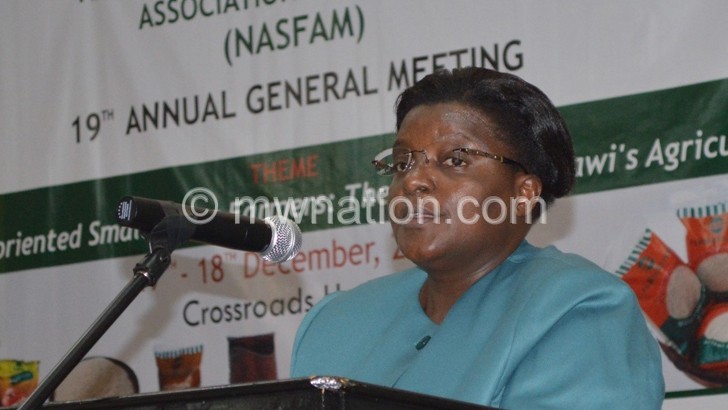K161bn multi-donor ASWAp—SP ends
The World Bank which three weeks ago announced resumption of general budget support to Malawi disclosed last week the closing date for the Agriculture Sector Wide Approach Support Project (ASWAp-SP).
World Bank public relations officer Zeria Banda confirmed the end of the $215.7 million (K161 billion) project, saying it has reached its closing date which was December 30 2016.

Banda said the project which was also supported by the International Development Association fund for the poorest countries, was a Multi-Donor Trust Fund (MDTF) where several donors contribute funds which are administered by the World Bank. Other donors to the project were Norway and the European Union (EU).
ASWAp-SP was one of the major development targets for Malawi to overhaul and develop a new national agriculture policy, a revised national seed policy, and management guidelines for the strategic grain reserve.
“The project has been on since 2008. We are aware that there are funds remaining in the ASWAp-SP MDTF. These will not be lost, but will be put into a new MDTF that will be available to the government anytime soon. The successor MDTF will also be aligned to the National Agriculture Investment Plan under development. So nothing has been foregone,” said Banda.

According to the projects concept note the ASWAp-SP was meant to facilitate transition of farming communities from subsistence production to non-traditional high-value agricultural value chains that would ultimately result in wealth creation.
Secretary for Agriculture Erica Maganga described the closure of ASWAp-SP more of a technical than practical nature.
She said government is technically closing the implementation phase that began in 2008 to properly evaluate the extent to which the initiative has met its objectives.
“At the same time, government is preparing new projects in collaboration with development partners that will become effective in a few months to come,” said Maganga.
She said the technical process will also allow Ministry of Agriculture, Irrigation and Water Development to properly align the new efforts to the newly-launched National Agriculture Policy and the National Agriculture Investment Plan that is in the offing.
“While these processes are taking place, a time lag of a few months is expected during which there will be inactivity at implementation level.”
However, she said the outgoing phase of implementing the ASWAp-SP has made a lot of progress.
She cited increased average yields of maize through popularisation of maize intensification technologies spanning from use of high yielding varieties, improved agronomic practices, conservation farming and post harvest handling.
“The project has set off a banana rehabilitation programme in key districts of Mulanje and Thyolo where banana bunchy top virus disease wiped out the bananas. Disease free plantlets were imported and distributed to selected beneficiaries who have planted them and suckers from the initial lot are being used to expand hectarage and benefit more farmers.”
This initiative, she said, will be expanding to Nkhotakota and Nkhata Bay. To further support continued efforts to rehabilitate the banana industry, the project has rehabilitated tissue culture laboratories at Bvumbwe, Chitedze and Lunyangwa research stations to increase capacity for rapid multiplication of clean banana planting materials as well screening for the banana bunchy top virus disease.
An agriculture analyst Tamani Nkhono-Mvula said ASWAp-SP was not supposed to be there forever as it was a capacity building project.
“The stoppage of funding to such projects should be a natural thing,” he said. n






Could you please tell us what this project has achieved so far and which individuals have benefited from it..?